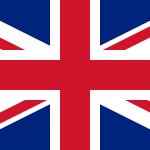Flag waving
There are two flags in my study; one royal blue and white and bearing the name and crest of Leinster Rugby, for which I buy a season ticket each year, the other the sky blue and white colours of the French club Aviron Bayonnais, whom I follow from afar, the flag being a souvenir of a trip to San Sebastian to see Bayonne beat Stade Francais. To be honest, neither flag has ever been waved in anger, not even with half hearted enthusiasm – waving flags brings too many memories.
Spending much of my adult life in Northern Ireland, flags became associated with militancy; the British union flag was employed by those who favoured a violent loyalism, while the Irish tricolour was employed by the exponents of violent republicanism. It was difficult to see either flag being waved without recalling the Troubles.
Memories of violent times came back at lunchtime as plastic flags were passed around in the room, the intention being to welcome the Olympic flame that was passing through this small Welsh town this afternoon.
Standing among the crowd who lined the pavements, there was much to ponder in the huge resurgence of desire to assert the national identity. Back in the 1960s, union jacks would have been seen everywhere, they were the stuff of popular culture. ‘I’m backing Britain’, declared the car stickers of the time. Perhaps the flag was too easily hijacked by extremists in the 1970s.
Next week’s Diamond Jubilee and the summer’s Olympic games are occasions that would naturally bring forth a huge surge in flag waving, but there seem deeper and more complex processes also at work. Among this afternoon’s spectators there were academics and churchmen, hardly people given to old fashioned jingoism. There seems a deeper sense of a need to stress one’s identity and one’s loyalty.
The phenomenon has grown in recent years. Ceremonies of remembrance of those who have died in war were expected by some to slowly fade away as the passing years slowly took away the veterans. Yet, while there are no surviving veterans of the Great War, the commemoration of the dead has grown stronger and stronger. Leading a trip to the Western Front next week will mean standing at the Menin Gate at Ypres for the Last Post ceremony next Wednesday evening; the crowd will be huge, as it is night after night.
Those waving flags are a world removed from the thugs and the racists who for too long pretended the national flag was there own. Perhaps the legacy of the jubilee year will be a renewed confidence and pride in Britain as it is.



Comments
Flag waving — No Comments
HTML tags allowed in your comment: <a href="" title=""> <abbr title=""> <acronym title=""> <b> <blockquote cite=""> <cite> <code> <del datetime=""> <em> <i> <q cite=""> <s> <strike> <strong>